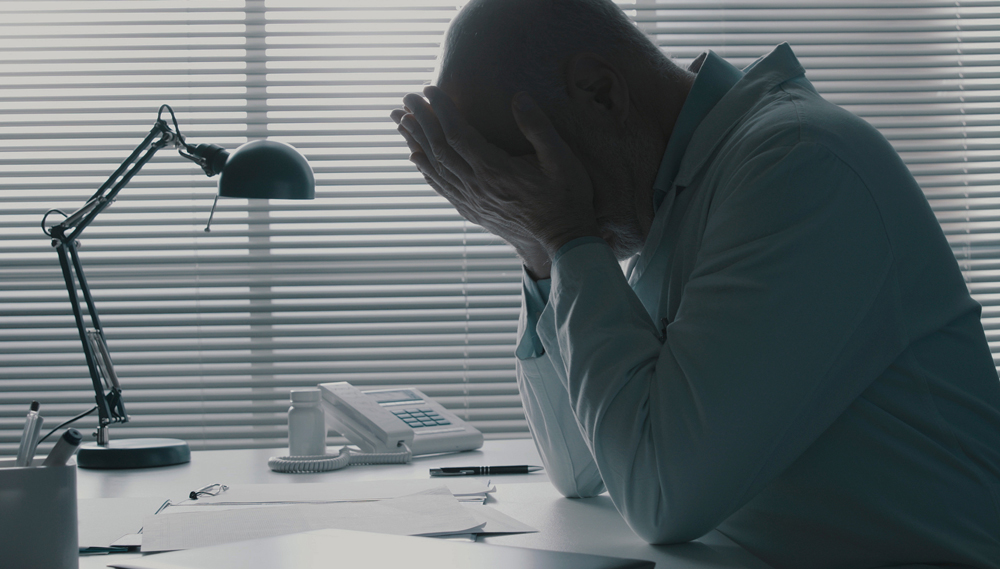MORE AND MORE PEOPLE IN HIGHER POSITIONS KNOCK ON THE CAREER GUIDANCE CENTRE’S DOOR

“When I opened my inbox on Monday, I immediately closed it and called in sick.” Or: “I couldn’t stop thinking about work. Day and night, during the week and weekends, during my holidays…”
I don’t know about you, but I hear more and more friends and colleagues talking about how they can’t cope anymore. The word burn-out isn’t always used, but the stories don’t lie. And the Flemish government’s workability monitor confirms that well-being at work is changing for the worse. Workability figures dropped below 50% for the first time in 2020.
The ACV career coaches also see an increase in the number of questions about mental health at work. We questioned them about the causes of this unhealthy trend. And how you can protect yourself.
Causes
It will come as no surprise that workload is an often stated cause. The bar is set higher and higher. And that sometimes leads to extreme situations. For example: career coach Annelies Dousy was approached by a man who was the only remaining commercial manager in his company, with clients from the US to Asia. “Because of the time differences in that area, he never had any rest. He was globally and constantly available. There was always a customer awake somewhere. The pressure was enormous. But the man was so passionate about his profession that he didn’t want to stop. He kept going until he couldn’t anymore. And even longer than that. Because three days after undergoing surgery, he was taking phone calls in his hospital bed.”
And that brings us to another cause: employees who experience burn-out are very often ‘ideal employees’, explains career coach Saskia De Bondt. “Passionate. Perfectionists. Loyal. Responsible. Driven. Empathic. Beloved. They never want to say ‘no’. They always find a reason to say ‘yes’: they don’t want to disappoint anyone, they don’t want to bother anyone else, they want to be sure it’s done well … It is, however, perfectly okay to say ‘no’. You are allowed to say you don’t want to do something, that it isn’t your job to do it. You are also allowed to delegate things. And even as a manager, you are not responsible for everything and everyone.”
Another cause is a mismatch between the organisation and the employee. “There are no good and bad company cultures,” explains Annelies. “Every system has its advantages and disadvantages.” And she explains that she has already coached managers who succumbed to too much structure, but also executives who couldn’t deal with the lack of clarity. There was, for example, a man in a family construction company who changed his mind when the company was sold and the friendly atmosphere changed. But she has also coached managers who needed a clear structure.
“It’s important to look for accompany that suits your needs,” Saskia explains. “There is nothing wrong with properly screening the companies you’re applying to. During the application process, you can ask questions about the nature of the company, the company culture, the job content and your responsibilities. Perhaps you can speak to a few of your future colleagues or try out a day’s work. All of that is better than ending up in a company that doesn’t suit you.”
It’s okay to say no
That brings us to the question of how to find a healthy balance. Prevention is always better than cure, as is proven here as well. Open communication and clear boundaries are important. And that’s where the problem often lies. “Driven employees assume that everything is part of their job. But when you ask if they have checked whether that’s the case, it turns out they haven’t talked to anyone about it. At most, they mention it in passing, without going into too much detail. Or they assume that someone around them will have noticed. But that is often not the case.”
Taking sufficient time to relax is also important. “We often hear people say they have no time anymore for their hobbies. They are, however, essential to keep going,” explains Annelies. “No longer having any time for or any interest in your hobbies is an important sign. If you ignore it, you will face the consequences later on.”
Time helps
When things do go wrong, ’time’ turns out to be the best remedy. “I was once contacted by a manager who wanted to be back to who he was a week later. But, unfortunately, it doesn’t work like that,” says Saskia. “Recovery takes time. Otherwise you are just preparing for your next crash.” But it isn’t always easy. “Quite a few employees, especially those in higher positions or with a lot of responsibilities, feel guilty for being ill. Or they focus on their own role in their crash. Their confidence has very often taken a huge hit. I often hear that they can’t stop worrying, that they keep going round and round in the same circle.”
The ACV career coaches are there to help you. “We will break that cycle together. We listen to their story and make them look in the mirror. By taking some distance from the daily rush and taking a minute to reflect, most people quickly figure out what the problem is.” And from then on, you can start working on step-by-step solutions. It’s a search for what you want and what you’re looking for in a job. Or what you don’t want. What gives you energy? What takes all the satisfaction out of your job? How do you find a balance between the two? What is your role in the situation? What can you control? But also, what is the role of others or of the organisation you work for?
“Changing jobs is not always the right or only solution,” says Annelies. “Sometimes you can also rearrange things within your job, make better arrangements on your job responsibilities, provide clarity … But other times changing jobs or position is the only solution. It will be clear at the end of the recovery process we go through what the right solution is. Together, we’ll come up with a personal action plan with options for the future.”
Do you have any questions about your job’s workability? Do you want to know more about the ACV Career Guidance Centre’s approach? Don’t hesitate to get into contact. You can find all information on www.loopbaanontwikkeling.be.
Never Work Alone 2022 | Author: Jan Deceunynck | Image: Shutterstock

